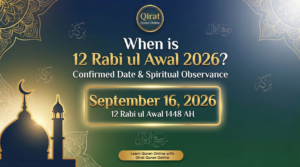The Profound Benefits of...
Read MoreBlogs
Jumma Mubarak Quotes
Jumma Mubarak Quotes :...
Read MoreWhen Is Eid
Eid ul Fitr 2026...
Read MoreWhen Is Hajj
Hajj 2026 Start and...
Read MoreWhen is 12
12 Rabi ul Awal...
Read MoreIslamic New Year
Islamic New Year 1448...
Read MoreWhen is Shab
Shab e Barat 2026...
Read MoreWhen Is Shab
When Is Shab e...
Read MoreWhen is Shab
Shab e Barat 2025...
Read MoreYour Journey to Islamic Knowledge Starts Here
The Qirat Quran Online Blog is a special place where students, parents, and learners all over the world are enabled to get authentic information about the Islamic religion and useful information on Quran learning. We are aiming to supervise your spiritual path simplifying it, making it clearer, and more significant by writing articles thoroughly researched and well-considered.
You can also get a variety of information here like Tajweed regulations being taught on plain English, step by step learning of Quran to beginners, teaching kids and adults about it, tips of memorization and Hifz, Islamic lifestyle tips to remind you of your faith, and inspirational content to help your faith grow stronger.
Each blog post is designed to help you improve your recitation, understand the deeper wisdom of the Quran, and develop a stronger connection with Allah—whether you are learning at home, studying online, or guiding your family on their Islamic journey.

FAQs
The Qirat Quran Online Blog serves to provide a variety of educational and religious information that is aimed at the learners of all ages. You will also get Quran learning tips, Tajweed rules explained in plain words, starting with guidance, and articles on the Islamic lifestyle, and motivation to students who desire to learn to get better in their recitation or they want to start Hifz. We also write parenting tips to individuals who like to teach their kids Quran at home and information on articles that focus on Islamic values, reminders and reflections to enhance your bond with Allah. We are aimed at offering useful knowledge that will assist in your learning process and towards the spiritual journey
We will publish new, valuable, and interesting posts on the blog as frequently as possible. New articles are usually published on the weekly or bi-weekly basis, therefore, leaving the readers with something new to read every single time. These are Quran recitation tips, Tajweed lessons, Islamic reminders, and success stories of students and seasonal Islamic content such as Ramadan preparation or Eid considerations. We have a group of educators and authors, who strive in their endeavors to provide instructive content that can enrich not only novices but also mature students.
Yes, absolutely. Our blog is well synchronized with assisting novices to make tiny yet assuring strides in their studies of the Quran. Most articles begin with the basics, like learning to understand Noorani Qaida, learning basic rules of Tajweed, finding the right class, or creating a schedule that enables the learning process. We simplify the complex concepts in simple explanations in order to make the instructions easy to understand and put into practice by new learners who have not studied Quran recitation before. Our blog give you simple steps towards the start-up or after a long hiatus
Learning the Quran with beautiful recitation is a good place to start and this involves learning the correct rules of Tajweed, learning Makharij (points of articulation) and rehearsing. Begin with doing things properly and then you should work on the pronunciation without attempting to add the melody or the rhythm. Listening to experienced Qaris will make you build tone, flow and emotion. Recite by recording so that you can observe your errors as well as enhance organ control. Above all, recite with earnestness and heartiness – when one recites with humility and with piety then, threading the path of recitation, she herself will be a beauty. It takes practice, guided learning and time to make one improve the beauty of Quran recitation.
Women will be in a position to memorize the Quran at home using a systematic course that suits their day to day chores. Begin with small doses- 3-5 lines/day etc – gradually. Find a calm environment, read aloud, and repeat polish to enhance memory. Audio recitations are also good in retention and Tajweed. Regularity is fundamental even in a brief period of time. Online attendance in Hifz may also aid in accountability, guidance and support of a qualified teacher. Women are able to memorize Quran in the comfort of their homes with discipline, the right environment and with the pure intents
Kids memorize faster when learning is fun, simple, and repetitive. Start with short surahs and break them into small portions. Use engaging methods like listening to recitations, repeating after a teacher, or using visual aids. Keep sessions short—10 to 15 minutes daily—to avoid fatigue. Morning time is ideal because the mind is fresh. Encourage your child by celebrating small achievements and creating a positive environment. Regular revision is essential, as young learners forget quickly. With consistent practice and gentle motivation, kids can memorize Quran surahs faster and more confidently.
Knowing the Quran by heart is of supreme spiritual, emotional as well as personal advantage. It makes you closer to Allah, Iman is enhanced and peace and tranquility is achieved to the heart. Hifz makes memory sharp, brings more focus and discipline. People who learn by heart the Quran receive tremendous rewards both in this world and the Hereafter and the Quran becomes their companion and intercessor. Parents that motivate their children in Hifz are also highly rewarded. The knowledge of Quran not only changes your character, but it cleanses your soul and makes your life full of blessings and guidance
You can read and listen to the Quran with accurate tajweed on trusted websites like Quran.com. It offers translations, tafseer, audio recitations, and word-by-word learning. But if you want to learn Quran properly with a teacher, then Qirat Quran Online is the best choice for guided recitation and Tajweed.









